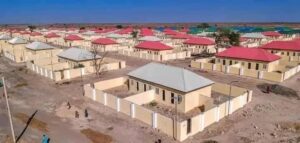NISE demands forensic probe of Banana Island building collapse
The Nigerian Institution of Structural Engineers has recommended a forensic investigation into the building collapse that occurred at Close 102, 1st Avenue, Banana Island, Lagos.
A report titled “Preliminary Report of the Building Collapse at Close 102, 1st Avenue, Banana Island, Lagos” noted that a team of the institution visited the site to undertake a preliminary assessment of the collapsed building and gather relevant information relating to the particulars of the collapsed building, hence providing recommendations.
It stated, “Lagos State Emergency Management Agency, in one of its releases, attributed the collapse to the pre-mixed concrete truck that ran into a load-bearing column of the building. A study of the area and the pictures revealed that the truck was probably discharging its concrete for the concrete work that was ongoing on the 6th floor.
“The site is tight and there could have been no room for the truck to have gathered enough momentum for an excessive lateral force. If this was truly the case, it could only confirm an inadequate design and detailing coupled with poor workmanship and construction supervision.
“Flat slab design in reinforced concrete high-rise building structures can be advantageous in terms of flexibility, construction time, and cost savings.
“However, it is important to consider the limitations and potential drawbacks associated with this design approach to ensure that the building can meet structural and safety requirements.
“The revelations from the defects observed during our site inspection make one doubt if these structural and safety requirements were adequately considered in the design and construction of all the blocks.”
According to the report, the video captured and the position of the truck seemed to imply that the collapse would have started somewhere along the transverse axis of the block C building, hence this could have involved the vertical elements (columns) or the foundation within the zone.
“Depending on the location and orientation of the column, especially for an edge or a corner column, the force may cause the column to lean or topple over, which can result in a domino effect of collapsing floors and columns as it seemed for this building.”
The report noted that it was unclear if the collapse could be attributed to design errors, construction inadequacies, human errors, or a combination of these factors.
It further stated, “The remaining blocks A, B, and D were said to have been of similar structural arrangement and design. These blocks have already shown signs of at least poor construction supervision. It is, therefore, imperative that they be subjected to a thorough structural assessment prior to their continued construction or otherwise.
“There is a need for further detailed structural investigation to be undertaken to provide sufficient information required to unravel the root cause of the collapse and proffer measures to forestall future occurrence.”
On the way forward, the report recommended that the other blocks be immediately cordoned off and propped to allow for a detailed structural appraisal to be carried out to determine their safety and suitability for use.
It recommended, “A full and detailed structural/forensic investigation is recommended to be carried out to unravel the cause(s) of the collapse and determine whether anyone was culpable, and the appropriate sanction applied to serve as a deterrent, unmask the project team, that is, the design professionals, the supervising team and the contractors, ascertain the adequacy of the structural design, probe the quality of workmanship, confirm the quality of the reinforcement and concrete materials used, and establish level/adequacy of supervision carried out during construction, and identify the role played by various individuals, professionals, and Government Agencies.
“All as-built structural drawings/design and other relevant drawings related to the construction of the buildings should be made available for a detailed review, the quality control and quality assurance documents, soil test report, and pile load test/pile integrity test report should also be made available for review. The result of the investigation should be made available to professionals in the field so that the experience gained could be shared for lessons to be learned.
“There should be a re-organisation in all sectors of the built industry including the supervising government organs.”
The Institute added that every professional should be made to practice in his area of core competence.
“Civil engineers must not be assigned to carry out structural engineering works unless they are certified structural engineers.
“Experienced structural engineers must be engaged to design and supervise this level of the building and other complex structural engineering works. This should apply to both the public and private sectors,” it asserted.




